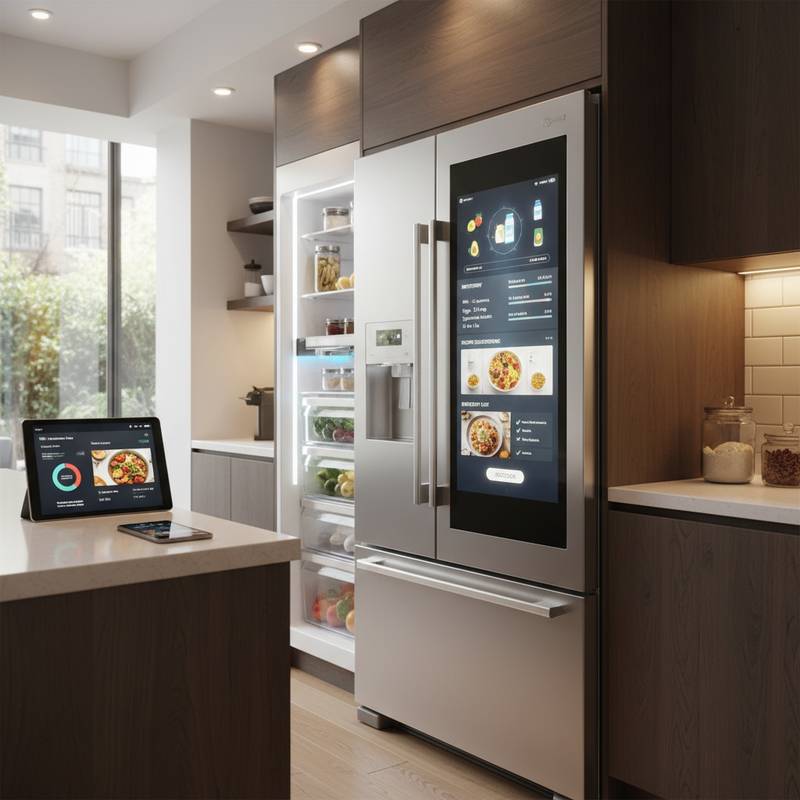How Smart Fridges Reduce Food Waste Through Automatic Inventory Tracking
Smart home technology has progressed beyond basic connectivity in lights and climate controls to create proactive kitchen environments. The smart refrigerator serves as the focal point of this advancement, evolving from a basic storage unit into a device that identifies contents, proposes meal ideas, monitors expiration dates, and initiates grocery orders. This development addresses a widespread issue in households: excessive food waste and inefficient shopping practices.
Understanding the Impact of Food Waste
Households frequently encounter the annoyance of spoiled produce or overlooked leftovers hidden in refrigerator compartments. Research from consumer organizations indicates that a significant portion of bought food goes unused, primarily due to oversight of inventory or expiration timelines. This pattern leads to financial losses and environmental harm, as excess purchases create a cycle of waste.
Smart refrigerators disrupt this cycle with built-in cameras, inventory systems, and linked mobile applications that provide visibility into contents without requiring the door to open. Certain models employ sensors to assess produce freshness, while others align items with suitable recipes. Users experience reduced spoilage, improved meal preparation, and more targeted shopping as a result.
Core Features of Inventory Tracking
The primary strength of a smart refrigerator lies in its capacity to record entries and exits of items. Through barcode readers, sensors, and image analysis, the device catalogs each addition to the interior. As expiration approaches for any product, notifications appear via alerts or the refrigerator's display screen.
Samsung Family Hub models, for example, offer live interior views accessible through a dedicated app. LG ThinQ series connect with voice assistants to signal low supplies of essentials like milk or prompt timely use of leftovers. Consistent tracking refines the system's predictions of usage patterns and recommends timely restocking.
Such capabilities extend beyond ease of use to encourage deliberate purchasing decisions. Families gain visibility into existing stocks, enabling meal plans that utilize on-hand ingredients and curb excess acquisitions. This approach yields cost savings and diminishes avoidable discards.
Automating Grocery Restocking
A standout capability in smart refrigerators involves self-replenishment through connections to online retailers. Known as auto-ordering, this function detects diminishing levels of basics such as milk, eggs, or butter and either executes a purchase or seeks user confirmation for a quick approval.
Early implementations like Amazon Dash Replenishment Service demonstrated this potential by allowing appliances to procure items from affiliated vendors. Contemporary refrigerators incorporate comparable mechanisms within proprietary networks. Integration with delivery platforms supports options for alternatives or scheduled arrivals.
Consider returning home to discover that essentials have been replenished without effort. This efficiency not only streamlines routines but also advances sustainability by limiting overbuying and preventing spoilage from surplus quantities.
Enhancing Meal Planning and Preparation
Smart refrigerators function as advisory partners in cooking by generating recipe ideas from current inventory, considering factors like freshness and amounts. This resolves the common dilemma of deciding on meals through straightforward interactions via touch or voice.
If the device detects partial supplies of spinach, eggs, and cheese, it may propose an omelet or frittata option. Advanced systems coordinate with connected cooking appliances, such as ovens, to initiate preheating at optimal settings for selected dishes.
These integrations streamline kitchen workflows, spark culinary innovation, minimize waste, and conserve time. Users also benefit from guidance toward nutritious choices, as the refrigerator tailors suggestions to specified dietary needs.
Promoting Sustainability Through Data Insights
Smart refrigerators contribute to environmental goals by examining usage trends and offering household-specific feedback. Over time, patterns emerge, such as frequent overpurchase of perishables or recurring discards of particular items. The device delivers recommendations for refined shopping lists and portion controls.
Market experts forecast increased adoption of intelligent kitchen tools as individuals emphasize green practices. Home-based waste reduction represents a tangible step toward broader ecological benefits, and smart refrigerators facilitate sustained efforts without added complexity. This fusion of data and usability renders eco-responsible behaviors intuitive.
Building Seamless Smart Home Connections
Maturing smart ecosystems highlight the need for device compatibility. A smart refrigerator thrives within a networked setup, exchanging data with other household components. Protocols like Matter facilitate cross-brand harmony, enabling fluid information sharing.
In practice, the refrigerator interfaces with voice controls, pantry monitors, and planning software. Low stock for a preferred recipe triggers notifications to mobile devices or proposes pantry-based adjustments. This synergy fosters a cohesive kitchen operation.
Addressing Challenges for Wider Use
Despite their advantages, smart refrigerators encounter hurdles in market penetration. Higher upfront costs compared to standard units discourage some buyers. Concerns over data privacy arise from the collection of consumption details and family routines.
Producers respond with robust security measures, clear privacy frameworks, and upgradable designs that prolong utility. Declining prices and enhanced compatibility promise broader reach. For numerous users, ongoing reductions in waste and shopping frequency justify the starting expense.
Real-World Advantages in Daily Routines
Smart refrigerators deliver incremental enhancements that accumulate into significant improvements. Envision mornings where the device anticipates breakfast needs, confirms staple availability, and flags items requiring immediate use. These efficiencies cultivate orderly household dynamics.
Busy families appreciate remote inventory checks during outings. Professionals depend on automated restocking to avoid urgent errands. Solo dwellers leverage precise monitoring for scaled purchases that align with needs and cut excess.
Steps to Integrate a Smart Fridge into Your Routine
Adopting a smart refrigerator requires minimal disruption to existing setups. Most units pair with current smart tools, and apps simplify initial configuration. Success depends on regular engagement: log items upon storage, evaluate recommendations, and allow the system to adapt to your patterns.
Pair the device with a preferred grocery provider and define restocking limits for oversight. Incorporate recipe prompts to optimize ingredient use before expiration. These practices amplify convenience and financial gains.
As kitchen intelligence advances, the refrigerator emerges as a cornerstone of streamlined operations. It elevates storage to strategic management, aiding better planning, waste elimination, and sustainable choices. Intelligent homes evolve into anticipatory networks that ease everyday demands with practical, interconnected support.
